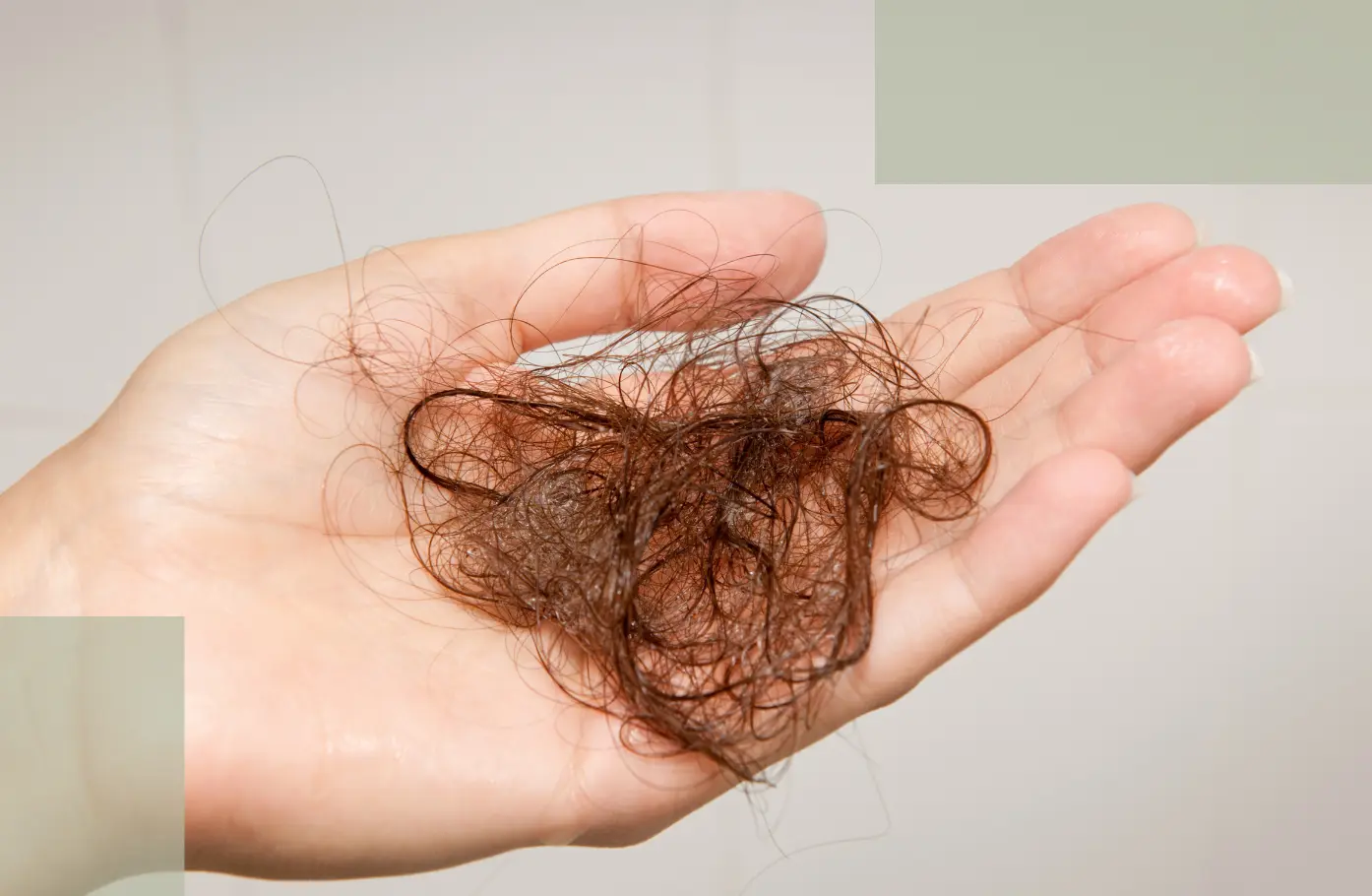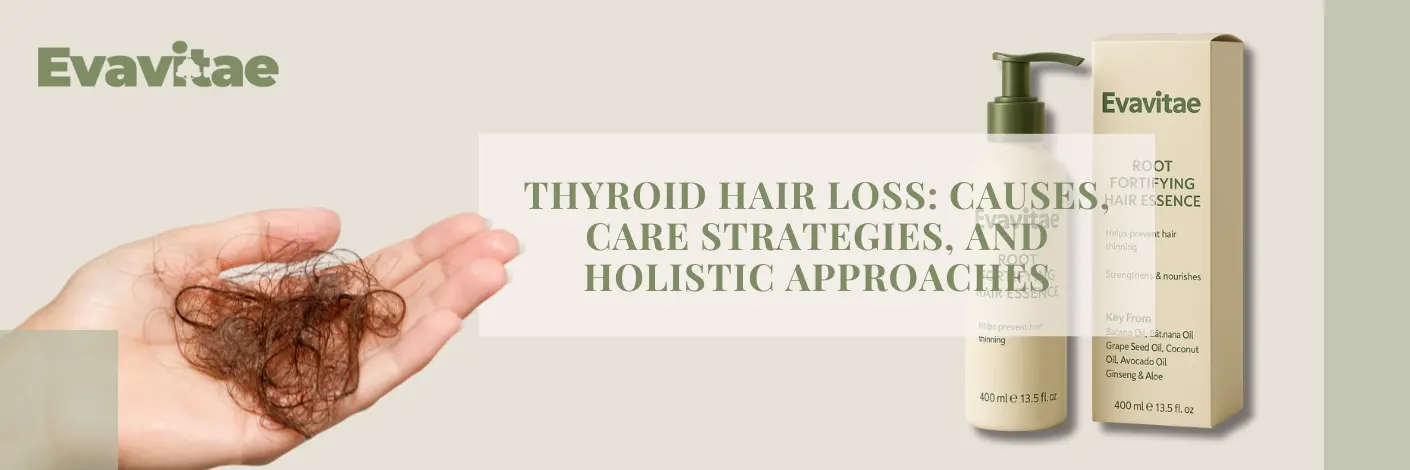
Hair health is often viewed as a reflection of overall well-being. When thyroid function is disrupted, one of the most visible consequences can be hair loss. Both hypothyroidism and hyperthyroidism can alter the delicate balance of hormones that regulate the hair growth cycle, leading to thinning, breakage, or widespread shedding. While this can feel alarming, a science-based perspective shows that thyroid-related hair loss is not only manageable but often reversible with the right approach.
The Connection Between Thyroid Function and Hair Growth
The thyroid gland produces hormones—triiodothyronine (T3) and thyroxine (T4)—that regulate metabolism, cell turnover, and protein synthesis. Since hair follicles are among the fastest-growing tissues in the body, they rely heavily on these hormones. Disruptions in thyroid function can prematurely shift follicles from the growth phase (anagen) to the shedding phase (telogen), resulting in diffuse hair loss.
Research indicates that up to 25% of individuals with thyroid disorders experience noticeable hair changes, ranging from reduced density to alterations in texture (Malkud, 2015). Unlike pattern hair loss, thyroid-related shedding is usually diffuse across the scalp, rather than concentrated in a specific area.
When thyroid imbalance affects hair density, many women also notice gradual recession around the temples or front hairline. You can read more about this pattern in our article on women’s hairline hair loss, its common causes, and prevention strategies.
Hypothyroidism and Hair Loss
In hypothyroidism, an underactive thyroid slows down the body’s metabolic processes. This can manifest in brittle hair, scalp dryness, and shedding. Other symptoms—such as fatigue, weight gain, or cold intolerance—may accompany hair concerns, providing a fuller picture of thyroid imbalance.
Nutritional deficiencies can exacerbate hypothyroid-related hair loss. Low levels of iron, vitamin D, and biotin are particularly common and can magnify the problem if left unaddressed (Moeinvaziri et al., 2009).
Hyperthyroidism and Hair Loss
In contrast, hyperthyroidism involves an overactive thyroid gland that accelerates metabolic processes. This can shorten the hair growth cycle, leading to fine, fragile strands and diffuse thinning. The stress of hormonal imbalance on the follicle environment often results in telogen effluvium, where hair enters the shedding phase prematurely.
Diagnostic Insights
Identifying thyroid-related hair loss requires both clinical evaluation and laboratory testing. Commonly measured biomarkers include:
- Thyroid-stimulating hormone (TSH)
- Free T4 and T3 levels
- Thyroid antibodies in cases of autoimmune conditions such as Hashimoto’s or Graves’ disease
Since hair loss is a non-specific symptom, testing helps distinguish thyroid-related shedding from other causes such as androgenetic alopecia, nutritional deficiencies, or stress-induced telogen effluvium.
Thyroid function is one piece of a larger puzzle. To understand how endocrine changes interact with other drivers of shedding, read this comprehensive guide to the causes of female hair loss and supportive, gentle care.
Nutritional and Lifestyle Support
Managing thyroid-related hair loss often involves addressing nutritional and lifestyle factors:
- Iron and Ferritin: Adequate iron storage is essential for thyroid hormone synthesis and follicle activity.
- Vitamin D: Low vitamin D levels are associated with autoimmune thyroid disease and increased risk of hair loss (Mackenzie et al., 2018).
- Balanced Protein Intake: Hair is composed of keratin, and insufficient dietary protein can impair regrowth.
- Stress Management: Chronic stress can worsen thyroid imbalances and contribute to further shedding.
Including whole foods rich in vitamins, minerals, and antioxidants supports scalp health and hair growth. Resources such as the National Institutes of Health (NIH) provide reliable nutritional guidelines for maintaining thyroid and metabolic health (NIH, 2022).
Treatment Pathways
Medical treatment depends on the underlying thyroid condition.
- Hypothyroidism is typically treated with levothyroxine to restore hormone balance.
- Hyperthyroidism may require antithyroid medications, radioactive iodine therapy, or surgery.
When hormone levels stabilize, hair follicles usually return to their natural growth cycle. However, because the hair growth cycle spans several months, visible improvements may take 3–6 months after treatment begins.
Gentle Topical and Scalp Care
At Evavitae, we recognize that while systemic treatment targets the underlying thyroid imbalance, scalp care remains essential for comfort and regrowth support. That’s why our approach emphasizes gentle, sulfate-free formulas(click here to view Evavitae product ingredient list) designed to respect sensitive scalps. By focusing on safe, plant-based ingredients, we aim to provide daily care that complements medical treatment and helps individuals manage thyroid-related hair loss with confidence.
🌸 Want to understand what drives hair loss—and how to restore balance? See the Hair Loss 101 Hub.
Understand hormonal shedding and recovery methods in our Postpartum Hair Loss Insight Page.
When to Seek Medical Guidance
Hair loss should not be ignored when accompanied by other thyroid-related symptoms such as fatigue, mood changes, or irregular menstrual cycles. Consulting with a healthcare provider ensures that thyroid function is properly assessed and managed. Dermatologists and endocrinologists can collaborate to create an individualized care plan.
Conclusion
Thyroid hair loss highlights the complex interplay between hormones, nutrition, and scalp health. While the shedding can be distressing, it is often reversible with appropriate medical treatment and supportive care. Combining medical therapies with balanced nutrition and gentle scalp practices offers a holistic pathway to healthier, fuller hair(try the Evavitae haircare kit here).
References (APA Format)
- Mackenzie, T., Zumpano, M., Wong, J. (2018). Vitamin D deficiency and hair loss: Is there a link? Journal of Cosmetic Dermatology, 17(2), 230–236. https://doi.org/10.1111/jocd.12489
Malkud, S. (2015). Telogen effluvium: A review. Journal of Clinical and Diagnostic Research, 9(9), WE01–WE03. https://doi.org/10.7860/JCDR/2015/15219.6529 - Moeinvaziri, M., et al. (2009). Iron status in diffuse telogen hair loss among women. Acta Dermatovenerologica Croatica, 17(4), 279–284.
- National Institutes of Health. (2022). Dietary Supplements Fact Sheets. Retrieved from https://ods.od.nih.gov
Evavitae products are now available exclusively at www.evavitae.com.




Add comment
You must be logged in to post a comment.